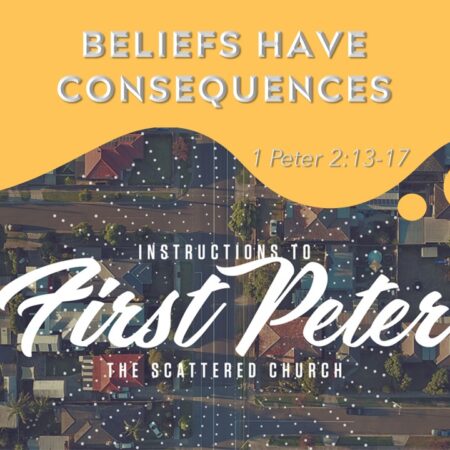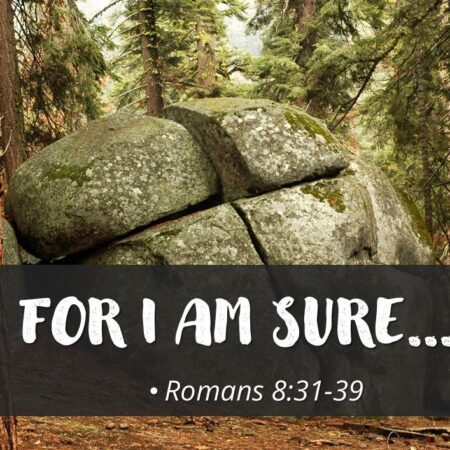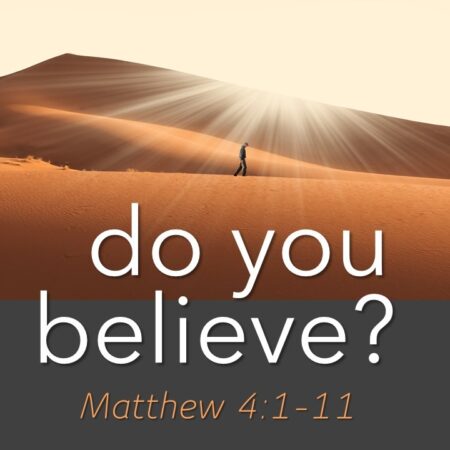1 Peter 4:15-19 Ephesians 5:25-27 2 Corinthians 11:2 (NLT) 2 Corinthians 11:3-6; 24-28 1 Peter 4:14-15 (NLT) Revelation 19:6-9 Revelation 21:1-6 Revelation 21:9-14 Carmen Joy Imes “Bearing God’s Name” “The…
"Identity" Tagged Sermons
1 Peter 2:13-17 Matthew 4:18-22 Acts 3:4-10; Acts 4:1-3; Acts 4:17-20; Hebrews 12:1-2 Responsibility as the key to Human Identity. Vaclav Havel writes: “Responsibility does establish identity, but we are…
Ryan Holiday is the author of a book titled: “The Obstacle Is The Way”
“There is an old Zen story about a king whose people had grown soft and entitled. Dissatisfaction with this state of affairs, he hoped to teach them a lesson. His plan was simple; He would place a large boulder in the middle of the main road, completely blocking entry into the city. He would then hide nearby and observe their reactions.
How would they respond? Would they band together to remove it? Or would they get discouraged, quit, and return home?
With growing disappointment, the king watched as subject after subject came to this impediment and turned away. Or, at best, tried halfheartedly before giving up. Many openly complained or cursed the king or bemoaned the inconvenience, but none managed to do anything about it.
After several days, a lone peasant came along on his way into town. He did not turn away. Instead he strained and strained, trying to push it out of the way. Then an idea came to him; He scrambled into the nearby woods to find something he could use for leverage. Finally, he returned with a large branch he had crafted into a lever and deployed it to dislodge the massive rock from the road.
Beneath the rock were a purse of gold coins and a note from the king, which said:
“The Obstacle in the path becomes the path. Never forget, within every obstacle is an opportunity to improve our condition.”
As Susan Perlman in an article she wrote for “Jews for Jesus” publication said:
“One might ask, “What do we need pain for? Couldn’t we accomplish the same things with pleasure?”
The answer has to be that in pleasure we focus on ourselves and our feelings and our perceptions, which makes us to be mindful of ourselves and our will to be pleased; whereas pain helps us to focus outside of ourselves, to reach beside ourselves, to find out what’s there. Pleasure tends to make one self-centered, whereas pain tends to make a more noble person, other-centered and, hopefully God-centered.
A crisis becomes an occasion for declension or advance. A self-centered person in a crisis can become more self-centered and wallow in self-pity. God-centered or God-seeking persons can be propelled forward in their quest for meaning.
It is important to know that we are not helpless and we are not hopeless. We can choose to decide how we will deal with pain. We cannot choose whether or not we will have pain, but we can decide whether or not we will ALLOW PROBLEMS TO AFFECT US.
To live is to endure the pressures of life. But we can decide if we are going to let these things press us down or if we are going to let them lift us up.”
David Aikman wrote a book titled” GREAT SOULS” and in it he writes:
“I have always personally been inspired by the lives of great people. It is hard not to be energized by the stories of how individuals have risen above adversity or suffering or have maintained a purity in the face of great temptation. Our age, with its habit of instantly judging a man or woman’s life based on the fragmentary and proverbial sound bite, is often impatient with detail, nuances, depth.”
Chuck Swindoll writes about Joseph:
“Here is one on the list of God’s “greats”…….a life lived for His glory and, equally significant, though he was terribly mistreated, lived high above the all-too-common reactions of rage, resentment, and revenge. Here is one who deliberately chose to overlook unfair offenses, to overcome enormous obstacles, and model a virtue that is fast becoming lost in our hostile age – forgiveness.”
At the outset, Joseph’s life showed little promise – a simple shepherd, twelfth of thirteen children, a dreamer hated by his brothers. So how did he become a man so extraordinary that Moses spent almost fourteen chapters in the Book of Genesis telling his story? Where did Joseph get the qualities of integrity, leadership, and godliness in such measure that they took him from the pit of slavery to prime minister of Egypt?”
Through Joseph
• God explained dreams
• Revealed the future
• Saved Egypt and Israel from starvation
• Demonstrates the depth of love God has for all of us.
Paul is right:
For I am sure that neither death nor life, nor angels nor rulers, nor things present nor things to come, nor powers, not height not depth, nor anything else in all creation, will be able to separate us from the love of God in Christ Jesus our Lord.
Carmen Joy Imes in her book “Bearing God’s Name” writes:
“Matthew’s gospel breaks neatly into five blocks of teaching, mimicking the five books of the Torah (Genesis, Exodus, Leviticus, Numbers, Deuteronomy).
These five blocks of teaching are preceded by an introductory story in which Jesus’ life is in danger because King Herod, like Pharaoh, is killing Jewish babies. To escape, his parents take him to Egypt. It’s an inside-out Exodus story. When the coast is clear, they return to Palestine, retracting Israel’s journey from Egypt to the promised land. Next, we fast forward to Jesus’ adulthood, where he passes through the waters of baptism in the Jordan, reminding us of Israel’s crossing both the Red Sea and the Jordan.
After this, Jesus is sent by the Spirit into the wilderness for forty days, where he reenacts Israel’s wilderness wanderings.”
Baptism does not produce salvation in this text, Rather, it corresponds to something that does, THE DEATH OF JESUS (v 19) and the RESURRECTION (v 21)
“Baptism saves” if one makes a decision; a pledge of loyalty oath,
a public proclamation of who is on the Lord’s side in the cosmic war between good and evil.
Every Baptism is therefore a reiteration of the past and future doom of the Watchers in the wake of the gospel and the kingdom of God.
Early Christians understood the typology of this passage and its link back to 1 Enoch and Genesis 6:1-4.
This is why early baptismal formulas included a renunciation of Satan and his angels. Baptism was anything but routine. It was a symbol of spiritual warfare.” Dr. Michael Heiser “Reversing Hermon”
Who is Azazel?
We find the Biblical text in Leviticus 16:7-10
“And Aaron shall take the two goats, and he shall present them before Yahweh at the tent of assembly’s entrance. Then Aaron shall cast lots for the two goats: one lot for Yahweh and one for Azazel. And Aaron shall present the goat on which the lot for Yahweh fell, and he shall sacrifice it as a sin offering. But the must present alive before Yahweh the goat on which the lot for Azazel fell to make atonement for himself, to send it away into the desert to Azazel.”
R.T. France
“His Father is testing him in the school of privation, and his triumphant rebuttal of the devil’s suggestions will ensure that the filial bond can survive in spite of the conflict that lies ahead.”
Dr. Michael Heiser in the “Unseen Realm” makes this comment about that temptation:
“Had Jesus given in, it would have been an acknowledgment that Satan’s permission was needed to possess the nations. It wasn’t. Satan presumed power and ownership of something that, ultimately, was not his but God’s. The messaging behind Jesus’ answer is clear: Yahweh will take the nations back by his own means in his own time. He doesn’t need them to be given away in a bargain. Jesus was loyal to his Father.”




